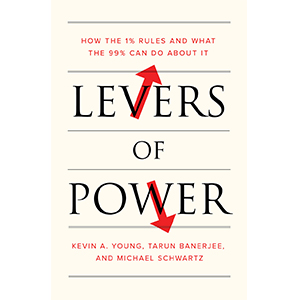Levers of Power: How the 1% Rules and What the 99% Can Do About It
It’s no secret that “the 1%” – the business elite that commands the largest corporations and the connected network of public and private institutions- exercise enormous control over U.S. government. While this control is usually attributed to campaign donations and lobbying, Levers of Power argues that corporate power derives from control over the economic resources on which daily life depends. Government officials must constantly strive to keep capitalists happy, lest they go on “capital strike” – that is, refuse to invest in particular industries or locations, or move their holdings to other countries – and therefore impose material hardship on specific groups or the economy as a whole. For this reason, even politicians who are not dependent on corporations for their electoral success must fend off the interruption of corporate investment.
Levers of Power documents the pervasive power of corporations and other institutions with decision-making control over large pools of capital, particularly the Pentagon. It also shows that the most successful reform movements in recent U.S. history – for workers’ rights, for civil rights, and against imperialist wars – succeeded by directly targeting the corporations and other institutional adversaries that initiated and benefitted from oppressive policies. Though most of today’s social movements focus on elections and politicians, movements of the “99%” are most effective when they inflict direct costs on corporations and their allied institutions. This strategy is also more conducive to building a revolutionary mass movement that can replace current institutions with democratic alternatives.
RM75.00
Out of stock
Description
It’s no secret that “the 1%” – the business elite that commands the largest corporations and the connected network of public and private institutions- exercise enormous control over U.S. government. While this control is usually attributed to campaign donations and lobbying, Levers of Power argues that corporate power derives from control over the economic resources on which daily life depends. Government officials must constantly strive to keep capitalists happy, lest they go on “capital strike” – that is, refuse to invest in particular industries or locations, or move their holdings to other countries – and therefore impose material hardship on specific groups or the economy as a whole. For this reason, even politicians who are not dependent on corporations for their electoral success must fend off the interruption of corporate investment.
Levers of Power documents the pervasive power of corporations and other institutions with decision-making control over large pools of capital, particularly the Pentagon. It also shows that the most successful reform movements in recent U.S. history – for workers’ rights, for civil rights, and against imperialist wars – succeeded by directly targeting the corporations and other institutional adversaries that initiated and benefitted from oppressive policies. Though most of today’s social movements focus on elections and politicians, movements of the “99%” are most effective when they inflict direct costs on corporations and their allied institutions. This strategy is also more conducive to building a revolutionary mass movement that can replace current institutions with democratic alternatives.
Publisher: Verso
Paperback
2020
ISBN: 9781788730969
Related products
-
The Dust that Falls from Dreams
In the brief golden years of King Edward VII’s reign, Rosie McCosh and her three very different sisters are growing up in an eccentric household in...RM69.90 -
Cain
A controversial book in the mode of The Gospel According to Jesus Christ and the last novel to be written before the death of the great Portuguese...RM49.90 -
Three Tang Dynasty Poets
'Can I bear to leave these blue hills' A generous selection from three of the greatest and most enjoyable of Chinese poets Introducing Little...RM6.00 -
Lives of the Great Photographers
While certain photographs have become world-famous images indelibly printed on the cultural consciousness, the stories on the other side of the lens...RM180.00







